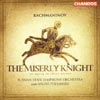Rachmaninov (The) Miserly Knight
Unexpurgated, this tale of monetary obsession makes disturbing listening
View record and artist detailsRecord and Artist Details
Composer or Director: Sergey Rachmaninov
Genre:
Opera
Label: Chandos
Magazine Review Date: 3/2005
Media Format: CD or Download
Media Runtime: 61
Mastering:
Stereo
DDD
Catalogue Number: CHAN10264

Tracks:
| Composition | Artist Credit |
|---|---|
| (The) Miserly Knight |
Sergey Rachmaninov, Composer
Andrei Baturkin, The Duke, Baritone Borislav Molchanov, The Jew Mikhail Goujov, The Baron, Bass Russian State Symphony Orchestra Sergey Rachmaninov, Composer Valéry Polyansky, Conductor Vitaly Efanov, The Servant Vsevolod Grivnov, Albert, Tenor |
Author: David Gutman
Like The Merchant of Venice, The Miserly Knight is nothing if not problematic. It’s a setting of Pushkin, whose faux-medieval tale of corruption kicks off with Albert, a callous young knight coveting his miserly father’s enormous wealth. Solomon, the moneylender to whom he is already in debt, suggests approaching a co-religionist for the poison with which to do away with the avaricious Baron. In this way Albert would inherit sooner rather than later.
Philip Taylor’s booklet-note implies that, but for the Baron’s monologue in Scene 2, Rachmaninov’s vocal writing is less interesting than his dense orchestral invention. Meanwhile the more flagrant shortcomings of the piece are brushed under the carpet. Perhaps Borislav Molchanov needs to sound obsequious in the role of the moneylender; only you can decide whether Solomon’s music has a consciously anti-Semitic whine – or is that merely a picturesque cantoral flavour?When BBC TV broadcast Glyndebourne Opera’s 2003 staging, the racism was downplayed, with subtitles carefully expurgated. Not so here. Chandos provides a full libretto that will shock the uninitiated, the more so when the character is rendered simply as ‘Jew’. This makes it even harder to sustain the notion of the moneylender as viable counterweight to Albert in a tripartite, non-judgemental study of monetary obsession.
For a conductor who sometimes sounds ill-at-ease away from the choral repertoire in which he made his name, Valéry Polyansky is here at his most punchy and committed. The role of the Baron, written for but never sung complete by Fyodor Chaliapin, is well taken by Mikhail Guzhov, deeper-toned if less expressive than Glyndebourne’s Sergei Leiferkus. His obvious rival on CD, albeit in a three-disc set of Rachmaninov operas, is Sergei Aleksashkin, equally splendid for Neeme Järvi. The earlier, echt Russian recording under Andrey Chistiakov, is outclassed by both. The music itself is no stretch, being stylistically reminiscent of Rachmaninov’s Second Symphony. An uncomfortable listen even so.
Philip Taylor’s booklet-note implies that, but for the Baron’s monologue in Scene 2, Rachmaninov’s vocal writing is less interesting than his dense orchestral invention. Meanwhile the more flagrant shortcomings of the piece are brushed under the carpet. Perhaps Borislav Molchanov needs to sound obsequious in the role of the moneylender; only you can decide whether Solomon’s music has a consciously anti-Semitic whine – or is that merely a picturesque cantoral flavour?When BBC TV broadcast Glyndebourne Opera’s 2003 staging, the racism was downplayed, with subtitles carefully expurgated. Not so here. Chandos provides a full libretto that will shock the uninitiated, the more so when the character is rendered simply as ‘Jew’. This makes it even harder to sustain the notion of the moneylender as viable counterweight to Albert in a tripartite, non-judgemental study of monetary obsession.
For a conductor who sometimes sounds ill-at-ease away from the choral repertoire in which he made his name, Valéry Polyansky is here at his most punchy and committed. The role of the Baron, written for but never sung complete by Fyodor Chaliapin, is well taken by Mikhail Guzhov, deeper-toned if less expressive than Glyndebourne’s Sergei Leiferkus. His obvious rival on CD, albeit in a three-disc set of Rachmaninov operas, is Sergei Aleksashkin, equally splendid for Neeme Järvi. The earlier, echt Russian recording under Andrey Chistiakov, is outclassed by both. The music itself is no stretch, being stylistically reminiscent of Rachmaninov’s Second Symphony. An uncomfortable listen even so.
Discover the world's largest classical music catalogue with Presto Music.

Gramophone Digital Club
- Digital Edition
- Digital Archive
- Reviews Database
- Full website access
From £8.75 / month
Subscribe
Gramophone Full Club
- Print Edition
- Digital Edition
- Digital Archive
- Reviews Database
- Full website access
From £11.00 / month
Subscribe
If you are a library, university or other organisation that would be interested in an institutional subscription to Gramophone please click here for further information.




